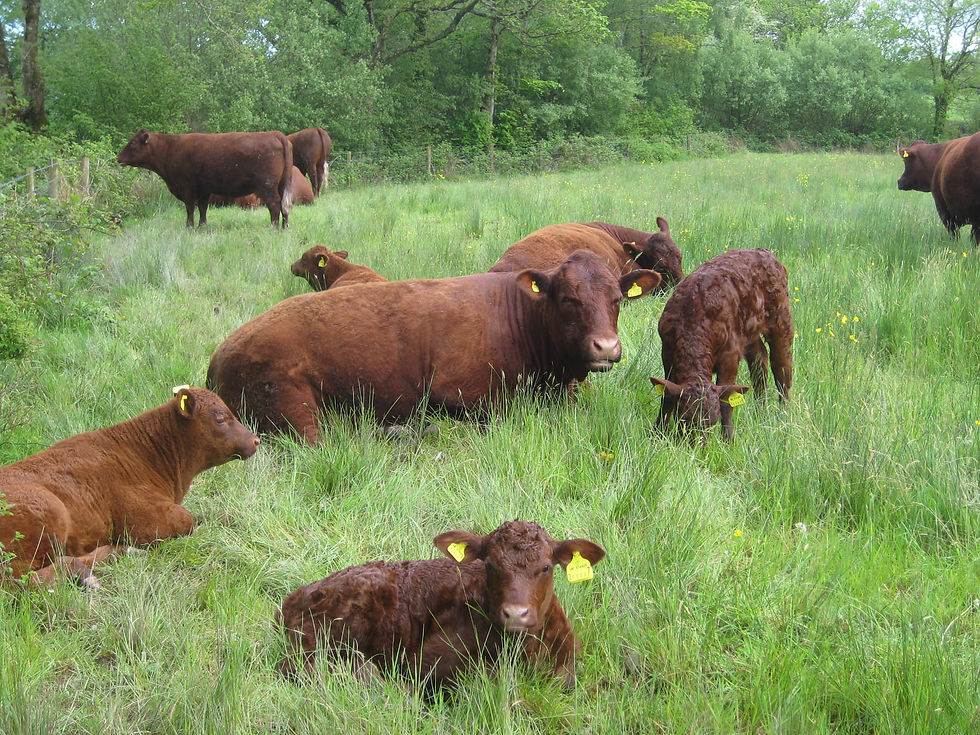A farmer's life for me?
- Emma Rosen
- Sep 15, 2016
- 4 min read
Debbie Kingsley sounds like a woman you wouldn’t want to mess with. She is an art consultant, a trainer, freelance writer, blogger, businesswoman and several other things in between. But perhaps most importantly, she is a proud farmer.
‘Complete serendipity’ is how Debbie found herself in this career. Nice Jewish girls from North London do not usually end up with livestock and one hundred acres in Devon. She is clearly someone who enjoys challenging the norm, with ‘no time for makeup’ or other vanities, up early working with her husband Andrew seven days a week.

Being a farmer is certainly not choosing life’s easy path, and she repeatedly reminds me not to idealise the lifestyle – it can be hard and will mean spending much of your time cold, wet and tired. When we speak at 10 am, she has already taken a steer (castrated male) to the abattoir, fed all the animals, done the mucking out, checked the cattle and sheep, and taken the dogs for a walk. That’s just the pre-breakfast routine. Meanwhile, I had settled down to a cup of tea before drawing up some questions for our interview.
If I want to be a farmer, I need to kiss goodbye to my treasured lie-ins. Not that I consider myself lazy by any means – I am an active person and a weekend lie-in constitutes about 9am for me, if anything this is pretty good for someone in their early (ok, mid) twenties.
As we continue speaking, her passion for her career choice and lifestyle shines through, and she tells me how being outdoors on a sunny day surrounded by green fields and healthy animals never gets old, even after twenty five years. She seems to genuinely love getting up in the morning to do her job – how many of us dream of that?
Of course, the days it rains are a little more difficult. But Debbie tells me that once she’s up it’s fine, and if anything, the worse the weather, ‘the more care the animals need.’ This is a point I’d not considered and I can see how it would spur you up even on the bleakest of mornings.

South Yeo Farm West focuses on rare and native breeds, with over one hundred ewes, cattle, pigs and poultry. This is because Debbie and Andrew share a philosophy of supporting native breeds to increase the diversity of gene pools, and besides this, local breeds will do best on the land they were selectively bred for. Of course this is a business, she reminds me, so all are also chosen for their great tasting meat. The farm send meat boxes directly to clients rather than to supermarkets, as it means they earn more per animal, which is crucial for a small business wanting to remain in control. Supplying supermarkets means farmers are reliant on the prices set in head offices, which are much more likely to vary. Her enthusiasm for this business model is evident, and she clearly takes pride in rearing an animal through its lifecycle, to be able to supply a very high quality product to her loyal customer base.
This is a stark reminder that killing animals is part of the business and we spend a while discussing this point. She of course sympathises and sincerely finds it sad, but ‘it is the circle of life’ and she is proud to give each animal the best quality of life she can. Ultimately though, it is how she makes money. This is an issue that it could be easy to get emotional about, especially given that many of us are now so removed from where our food originates from. Whilst I am not sentimental about it, I do feel very strongly about the quality of life of animals reared for their meat, milk and/or wool. But as Debbie highlights, this is part of the job, and my concerns can be mitigated as I would be the one in control.
She then begins to tell me that she believes farmers are massively underestimated, and makes a convincing argument. They need to be the vet, midwife, entrepreneur, marketer, distributer, negotiator, and an astute business person, as well as be a general DIY god, make hay and a whole host of other things. Let’s not forget her other work as an art consultant, a freelance writer, a trainer and so on. It becomes apparent that to be successful in this career you need to be very organised, self-motivated and good at time management as on a smaller farm you need several strands of income. Fortunately, I am a big fan of portfolio careers, so this would suit me just fine.
Would I make the cut? I am going to be helping out with the lambing at Moor View Alpaca farm in January. I was told that if I like farming in the middle of winter, then it’s the career for me.
To be continued in January 2017.

Extras
Read more about South Yeo Farm West, Debbie’s work as an art consultant, as well as Moor View Alpacas.
All images © Debbie Kingsley.